Starting a sustainable travel journey in Rwanda is thrilling. It lets you see the country’s beautiful landscapes while traveling responsibly.
Rwanda is a leader in eco-friendly tourism. It has many projects to help travelers be green. You can stay in eco-friendly places, use green transport, and see the parks and communities without harming the environment.
Key Takeaways
- Explore Rwanda’s national parks with eco-friendly tour operators.
- Choose sustainable accommodations that support local communities.
- Minimize your environmental impact with responsible travel practices.
- Engage with local communities through cultural experiences.
- Support conservation efforts through eco-friendly activities.
Planning My Sustainable Journey Through Rwanda
Planning a trip to Rwanda that’s good for the planet is key. As a traveler who cares, making smart choices is vital. These choices help the local environment and community.
Researching Eco-Friendly Accommodations
Finding places to stay that are kind to the earth is a big part of planning. Lodges and hotels in Rwanda use renewable energy and cut down on water waste. They also recycle.
Some places are built with local materials and fit right into nature. This helps them use less energy. Look for places that have been recognized for being green.
Sustainable Transportation Options in Rwanda
Choosing how to get around is also important. Rwanda offers electric or hybrid vehicles for safaris and trips. You can also rent bikes or join walking tours.
Kigali, the capital, is great for walking or biking. This way, you can see the city and help the planet at the same time. Using green ways to travel helps Rwanda’s environmental conservation efforts.
Rwanda’s Commitment to Environmental Conservation
Rwanda is leading the way in sustainable living. It has launched many eco-friendly projects that are changing tourism in the area. The country is dedicated to protecting its environment in many ways, making travel there better.
The Nationwide Plastic Ban Initiative
Rwanda is fighting plastic waste with a nationwide ban. This move has cut down plastic pollution a lot. It encourages everyone to use biodegradable items instead. This effort keeps Rwanda’s environment clean, attracting those who love ethical travel Rwanda and green travel Rwanda.
Reforestation Projects and Green Spaces
Rwanda is also focusing on reforestation and green spaces. These projects make the country look beautiful and help local animals. By using sustainable forestry, Rwanda keeps its natural beauty alive and supports sustainable living Rwanda.
Wildlife Protection Programs
Rwanda protects its wildlife with strong programs. These efforts help endangered animals, like mountain gorillas, and their homes. By helping these programs, Rwanda makes sure its wildlife is safe, creating great opportunities for eco-tourism.
| Conservation Effort | Description | Impact |
|---|---|---|
| Nationwide Plastic Ban | Prohibition on single-use plastics | Reduced plastic waste, cleaner environment |
| Reforestation Projects | Planting trees in deforested areas | Restored habitats, increased biodiversity |
| Wildlife Protection Programs | Conservation of endangered species | Thriving wildlife populations, enhanced eco-tourism |
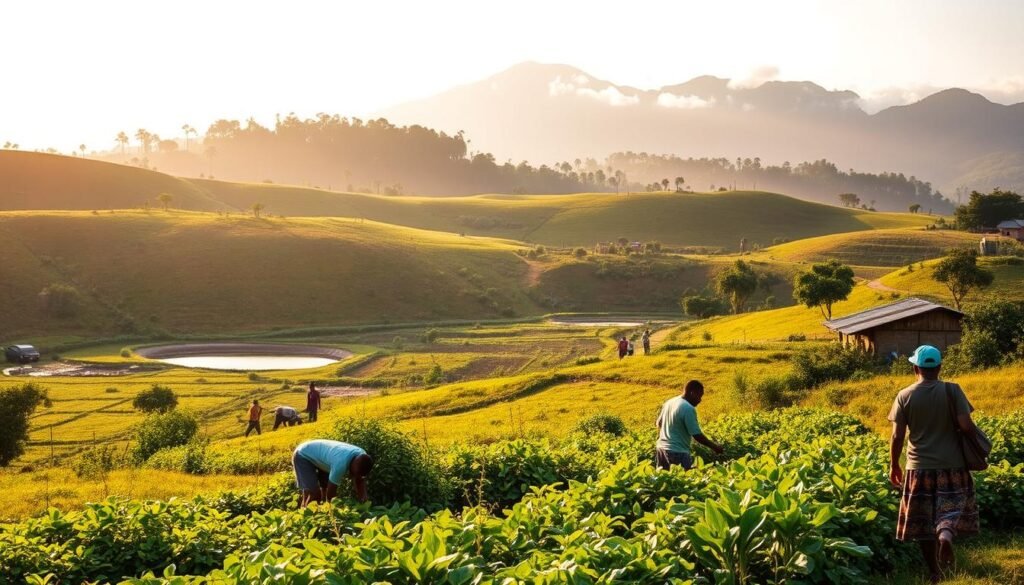
Eco-Friendly Wildlife Experiences
Eco-friendly wildlife experiences in Rwanda let you connect with the country’s rich biodiversity. The national parks and conservation efforts here offer a unique chance to explore nature responsibly.
Ethical Gorilla Trekking in Volcanoes National Park
Volcanoes National Park is famous for its ethical gorilla trekking. With strict rules, visitors can see mountain gorillas in their home. The guides ensure both gorillas and visitors stay safe, making it a memorable and responsible wildlife encounter.
Key aspects of ethical gorilla trekking include:
- Maintaining a safe distance from the gorillas to avoid disturbance
- Limiting the number of visitors to prevent overcrowding
- Supporting conservation initiatives through tourism revenue
Sustainable Safari in Akagera National Park
Akagera National Park offers a sustainable safari experience. It showcases Rwanda’s diverse wildlife and helps conserve the park’s ecosystems. Visitors can enjoy game drives and boat safaris while learning about the park’s restoration efforts.
The park’s conservation initiatives include:
- Reintroduction of native species
- Protection of habitats through anti-poaching efforts
- Community engagement and education programs
Bird Watching in Nyungwe Forest
Nyungwe Forest is a bird watcher’s paradise, with over 300 species recorded. Its canopy and diverse habitats make it perfect for spotting many bird species. Visitors can explore with guides to learn about the importance of conservation efforts in protecting this biodiversity hotspot.
By participating in these eco-friendly wildlife experiences, travelers help Rwanda’s conservation goals. Whether it’s gorilla trekking, sustainable safaris, or bird watching, Rwanda offers many ways to connect with nature responsibly.
Immersing in Local Culture Responsibly
Exploring Rwanda’s culture means we must be responsible tourists. We can positively impact by diving into local customs and backing community projects.
Community-Based Tourism Initiatives
Rwanda’s community-based tourism lets us connect with locals, learn their traditions, and help their economy. These projects aim to share cultures and foster understanding. They let us see the real Rwandan life.
Visiting rural areas, joining traditional events, and staying in community lodges are great ways to do this. These activities not only deepen our cultural understanding but also support local families financially.
Supporting Local Artisans and Businesses
Backing local artisans and businesses helps keep Rwanda’s culture alive. Buying local crafts and products boosts traditional industries and local economies. It also gives us unique souvenirs.
Rwanda’s arts scene is vibrant, with artisans making amazing items like baskets and woodcarvings. Supporting these artists helps keep traditional crafts alive and promotes cultural heritage.
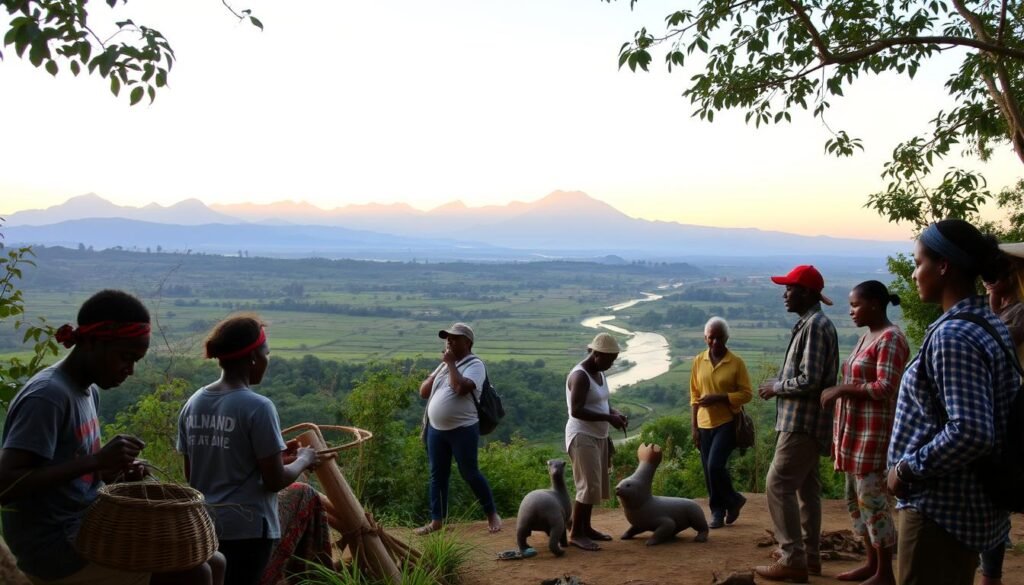
Participating in Umuganda Community Service
Joining Umuganda community service lets us bond with locals and give back. Umuganda, or “coming together,” is Rwanda’s national service day. It’s on the last Saturday of each month.
By joining Umuganda, we feel the Rwandan community spirit and make a difference. It’s a chance to help and learn from the community.
Sustainable Culinary Adventures in Rwanda
Exploring Rwanda’s flavors is a journey in sustainability. The country’s food scene is all about living green. It offers many ways for travelers to enjoy local food while helping the environment.
Farm-to-Table Experiences
Rwanda’s farm-to-table experiences are a big deal. Visitors can go on farm tours and cooking classes. They learn about old farming ways and how to make local dishes with fresh, organic ingredients.
This not only lets you taste real Rwandan food. It also supports sustainable agriculture.
Coffee and Tea Plantation Tours
Rwanda is famous for its coffee and tea. Plantation tours show how these are made and why sustainable farming practices are key. You’ll learn how coffee and tea go from seed to cup and get to taste some of the best.
Reducing Food Waste While Traveling
Being aware of food waste is important for sustainable travel. Rwanda has ways to cut down on waste. Travelers can help by picking places that care about the planet.
By choosing these sustainable food adventures, you support Rwanda’s environment and people. Every meal in Rwanda is a chance to connect with the culture in a green way. Whether it’s through farm tours, coffee and tea visits, or eating mindfully, you’re making a difference.
Conclusion: Reflections on My Sustainable Journey Through Rwanda
Rwanda is a gem for those who love the environment. It’s dedicated to keeping nature safe and has a rich culture. This makes it a top spot for eco-friendly travel.
Travelers can stay in places that care for the planet and use green ways to get around. My trip showed that we can see Rwanda’s wonders without harming it. We can help protect its beauty and support the people who live there.
It’s key to travel in a way that’s good for the planet. This way, our adventures can make a positive difference. My journey in Rwanda was unforgettable, showing us how to travel green.

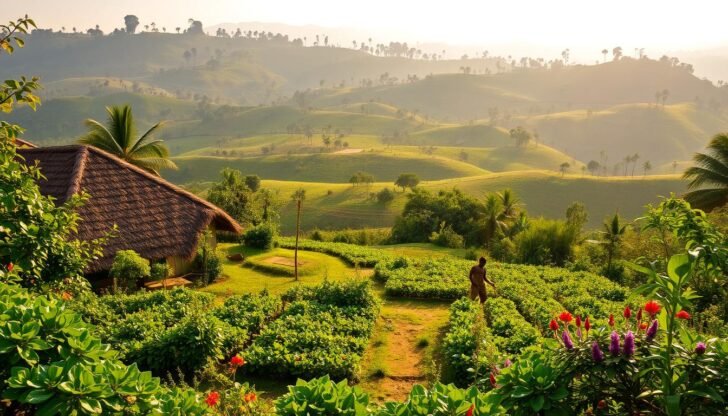

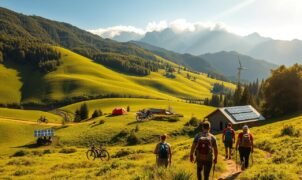
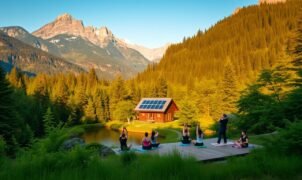
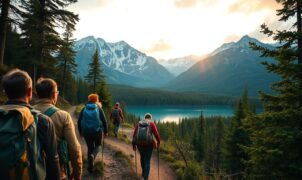











Leave a Reply